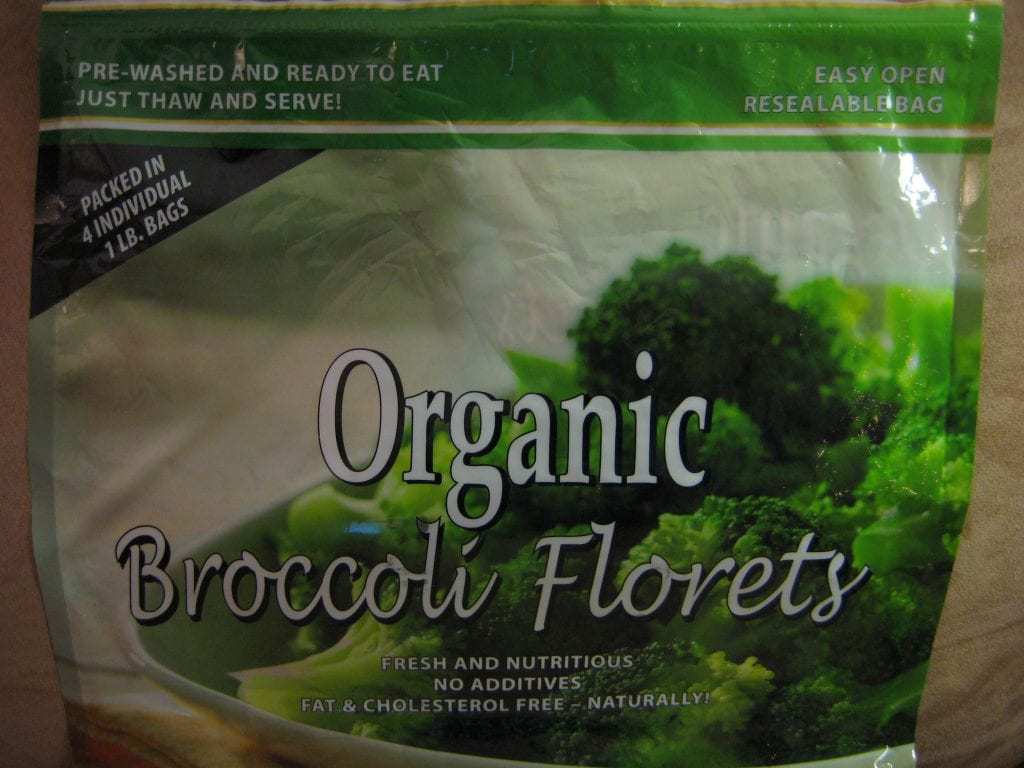 Frozen Organic Broccoli Florets – Costco – 4 lbs./ $5.99 ($1.50 per lb.)
Frozen Organic Broccoli Florets – Costco – 4 lbs./ $5.99 ($1.50 per lb.)
Benefits of Frozen Produce
In the age of local, raw and clean, health-minded cooks have become confused about frozen produce. Are frozen fruits and vegetables o.k. to use? Do they have any nutritional benefit? And even if not confused, individuals often overlook frozen options thinking that only diced carrots and peas are to be found in the uninspiring frozen food aisles.
But today, there’s significantly more variety of frozen produce, many organic and even local frozen winter CSA options, and a health crisis that could be chipped away at if we embraced what to add to our plates – produce – rather than focus on what to restrict. This makes frozen fruits and vegetables an attractive option.
The added benefits of preserved nutrition, lower cost, reduced waste, and huge time savings in the kitchen make frozen fruits and vegetables a therapeutic lifestyle staple.
Benefit of Frozen Produce #1: Nutrition
Note: the following discussion refers to options that contain only produce listed on the ingredients list – this conversations excludes those in sauces, seasoned, or mixed in frozen meals.
- The quantity of vitamins and minerals in frozen produce is comparable to fresh and potentially higher: Depending on storage conditions of fresh including how long it has been stored since being picked and at what temperature, frozen produce can retain more nutrients than fresh produce.
- Phytonutrients are largely more susceptible to heat (prolonged cooking and storage in high temps) than to cold (being frozen): Even the 1-3 minute blanching that is used in processing frozen vegetables causes only minimal nutrient loss; in fact, blanching reduces total cooking times further protecting nutrients.
- No-excuse way to ensure 1/2 your plate are Leafy & Tender Veggies: CARE members know the importance of their Leafy & Tender veggies in providing volume and a sense of feeling full at each meal, gut-friendly fibers, and cell supporting micronutrients and phytonutrients. With new in-the-bag steam options for leafy & tenders like riced cauliflower, chopped broccoli, green beans, and bell pepper stir-fry mixes, frozen options make long-term compliance to health and weight loss goals easier than ever.
- Real vs. ideal: In the end, the only nutritional consideration is what gets you to eat more produce; the ideal side of the spectrum is eating that piece of broccoli raw within an hour of picking, but most us live on the real end of the spectrum; if organic frozen broccoli allows you to eat it 3 times per week versus the 1 time per month (or year) you can ensure it’s been picked fresh- buy the frozen; it’s assumed that you will still have fresh, too, for variety.
Benefit of Frozen Produce #2: Cost
-
- Frozen is less expensive for out-of-season produce: Frozen berries in January will be less expensive than imported fresh berries. Even when in season, frozen can often still be less expensive.
- Even less expensive when bought in larger quantities at wholesale stores: Wholesale stores like Costco are increasing their offering of both organic and convention frozen produce, and offering it at significant savings over smaller packages found in grocery stores.
- Less food-waste: Frozen produce gives you the increased flexibility of when to use it; decreasing expensive and frustrating spoilage and waste.
- Great for make-ahead cooking: Total food spend decreases with make-ahead cooking (less last-minute take-out, less impulse buys at the grocery store, and fewer lunches out during the week); frozen produce can significantly reduce prep time to encourage you to do more make-ahead cooking.
Benefit of Frozen Produce #3: Convenience
- Frozen produce significantly reduces prep time: No hard rinds to peel, onions to dice, pods to remove, or washing needed! Lack of time is always listed as one of the main reasons people state for note eating more produce (followed by lack of planning and ideas). Let frozen produce help you tackle the time issue.
- Increased flexibility: Your schedule is no longer dependent on what fresh produce you have to use before it spoils; playing defense in the kitchen is never as rewarding (or relaxing) as playing offense.
- Decreases cooking time: As mentioned, blanching vegetables before freezing helps reduce their total needed cooking time; also, frozen produce – because it is prepped and ready to go – encourages you to still eat produce at the end of a long day when prepping fresh produce feels too overwhelming.
Which Applications are Better for Frozen Produce vs. Fresh
Frozen – whenever texture is not primary importance:
-
- Cooked dishes like soups (freezing alters the cell walls and will affect texture)
- Purees (cold or hot)
- Smoothies (frozen fruits and veggies like broccoli (a handful is wonderful in smoothies) eliminates need for ice cubes)
- Last-minute adds to stir-fries (no excuses for not having a mix of veggies with that pasta)
Fresh – whenever texture is important:
-
- Salad & fruit salads
- Pico de Gallo & salsas
- Pesto
- When produce is in-season and time permits
- When it’s just as easy to use fresh to ensure variety and daily intake of some raw produce
At the Store Tip
-
- Walk through the frozen aisle and compare it against your shopping list – know what frozen options are available before picking up everything fresh (this will vary widely by store).
- What options are there for lightning-fast stir-fry mixes to have in your freezer for ‘those’ days?
- Are there items on sale that you can stock up on?
Final note, confidently take the assist that frozen produce offers you. You aren’t cheating or eating any less clean. Rather, let frozen produce help you make a therapeutic lifestyle doable.
Warmly,


